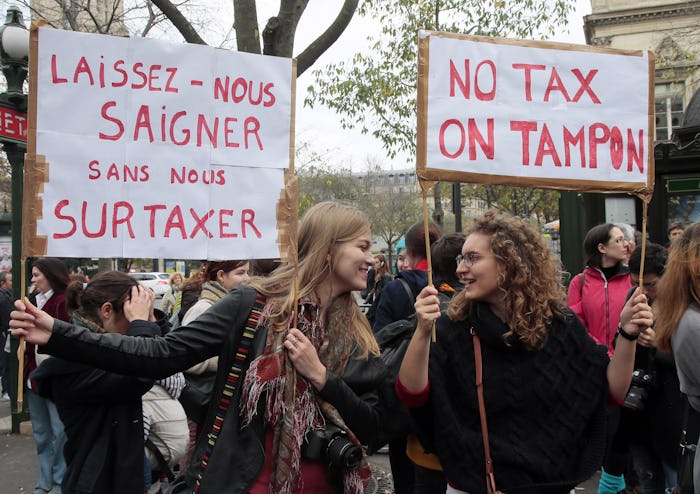Life

New York To Eliminate Tampon Tax & It's A Big Step In The Right Direction
New York has joined the growing list of states to remove, what's been dubbed, the "tampon tax," a state sales tax on items like, said tampons, and other feminine hygiene products – or in other words, items that are necessary for women to buy. Other states like Maryland, Massachusetts, Minnesota, New Jersey and Pennsylvania have already passed similar exemptions, and now, with New York about to eliminate the tampon tax, through legislation that passed in the state Senate on Monday, the hope is that more states will follow. Why? Because women shouldn't be penalized for having periods, period. And sales taxes on feminine hygiene products matter.
The sales tax applied to tampons aren't additional taxes or penalties. They are taxes that some states apply to categories of items and tampons and pads happen to be included. But here's why that's still problematic: state sales taxes vary from state to state, and are somewhat subjective, with some states imposing no sales tax at all. As NPR reported, Wisconsin has a sales tax exemption for Viagra, birth control, and yeast infection medication, but not for tampons or pads. Florida, a has a list of nontaxable medical items and food items that are exempt from its state sales tax but no exemption for tampons or pads. So why not exempt items needed for a woman's menstrual cycle?
We don't need to revisit seventh grade health class to know that a woman's period is not something she chooses to have. It's a biological process that, besides being a total drag at times, (cramps anyone?), it plays a key and natural role, to say the least, in the reproductive system. And a sales tax on such imperative items for women, can get pricey over the years, especially considering the present gender wage gap where women earn about 78.5 percent of what their male counterparts make. NPR recently cited research that calculated that women have about 450 periods in their lifetime. And at about $7 a box for tampons, the numbers certainly add up. (Everyone's periods send well wishes to New York's 4 percent state sales tax.)
Costs aside, not valuing feminine hygiene products in the same way as other health or medical-related items could help perpetuate stigmas. Period talk is still considered taboo. Socially, it may be unacceptable to say you have cramps at a dinner party, or, to pull out your tampon in class before heading to the bathroom. (Many of us can recall our best moves to slip a tampon in our pockets, or awkwardly lug our large bags to the bathroom, all for one tiny tiny tampon). This social conditioning has caused many women to feel ashamed of something that is so natural.
"To be sure, the tax on tampons and other similar products harkens back to a time when little was understood about women's biology and the vast majority of lawmakers were men," said New York Assembly member Linda Rosenthal, a Manhattan Democrat, told The Associated Press in a statement this week. Exactly. More understanding, more period talk, and no stigmas, are exactly what we need.